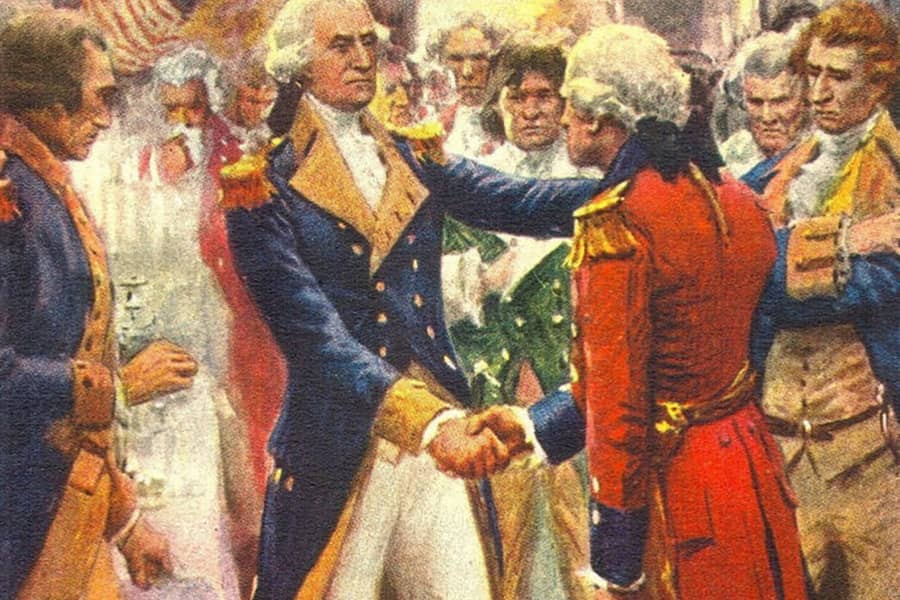The Ongoing Relevance of Washington’s Farewell Address

The Significance of Washington’s Farewell Address
Washington’s Farewell Address stands as a timeless beacon, guiding not only the fledgling nation but also contemporary society through the turbulent waters of political division and foreign entanglement. In a world increasingly defined by partisan strife, his profound warning against the perils of factionalism resonates more than ever. Washington foresaw how deeply entrenched divisions could undermine trust and cooperation among citizens, urging future generations to prioritize unity over discord. This call for national cohesion presents an essential lesson today, reminding us that polarization can threaten the very foundations of democracy.
Moreover, Washington’s cautious stance on foreign alliances reveals a prescient understanding of global dynamics that still informs U.S. policy today. His advice to avoid excessive entanglements with other nations encourages critical introspection regarding involvement in international conflicts. By advocating for strategic independence rather than blind loyalty to allies, he champions an approach that values pragmatic diplomacy over mere ideological alignment. As we navigate complex international relations—balancing our commitments while considering national interests—Washington’s insights serve as a compass for responsible engagement on the world stage, emphasizing wisdom over impulsiveness in decision-making processes.
Historical Context of the Farewell Address
As George Washington prepared to leave the presidency in 1796, the young nation was teetering on a precarious edge. Fresh from the Revolutionary War, Americans grappled with internal divisions and competing visions for their fledgling republic. Washington’s Farewell Address emerges not just as a personal statement but as a prescient warning against factionalism and foreign entanglements, reflecting his deep awareness of the challenges posed by emerging political parties and international pressures. His counsel to prioritize national unity over partisan loyalties resonates powerfully today amid increasing polarization.
Moreover, Washington’s reliance on historical examples lent weight to his arguments; he drew parallels between the tumultuous political landscape of 18th-century Europe and potential pathways for America. By looking back at failed republics that succumbed to discord, he implored citizens to remain vigilant against divisive forces. This appeal for unity can be seen as both timeless wisdom and practical foresight—a call that transcended his own era and continues to challenge contemporary leaders and citizens alike in our ongoing struggles with identity, governance, and global relations.
Key Themes and Messages Explained
Washington’s Farewell Address resonates powerfully through its exploration of unity and the perils of divisiveness. At its core, the message implores citizens to prioritize national cohesion over party allegiance, a theme that feels particularly urgent today amid increasing polarization. Washington foresaw the potential for factions to sow discord, advocating instead for collaboration across differences—a timeless reminder that strength lies in diversity rather than division.
Additionally, the address cautions against foreign entanglements while underscoring the importance of maintaining national independence. This notion isn’t just about avoiding military alliances; it extends to safeguarding American values in an interconnected world. As global dynamics shift rapidly, striking a balance between engagement and sovereignty has become essential—a principle Washington emphasizes as crucial even centuries later. Through these enduring themes, his farewell serves not just as a historical artifact but as a guidepost for navigating contemporary challenges in governance and civic responsibility.
Warning Against Political Factions and Parties
Washington’s chilling foresight regarding political factions and parties resonates profoundly in today’s climate, where divisive rhetoric often overshadows collective progress. He believed that allegiance to party politics could eclipse loyalty to the nation, transforming citizens into mere pawns in a larger ideological game. This scenario leads not just to polarization but also engenders a cycle of mistrust that undermines democratic institutions and erodes civil discourse.
As we witness the fracturing of communities over partisan lines, it becomes evident that Washington’s warning was not simply a cautionary tale; it was an urgent plea for unity amidst diversity. Political factions can breed an insular mentality, restricting dialogue and stifling innovative solutions to societal issues. In this way, the blessings of pluralism—where varied perspectives enrich democracy—can be suffocated under the weight of tribalism. Embracing his vision requires us to prioritize national interests over party platforms, encouraging empathic engagement instead of adversarial clashes even when faced with profound differences. Such commitment could rekindle the spirit of public service that transcends political affiliations—a remedy for our fraught contemporary landscape.
The Importance of National Unity and Integrity
National unity and integrity serve as the bedrock upon which a nation thrives, transcending political affiliations and social divisions. In an age marked by polarization and discord, Washington’s exhortation for unity is more relevant than ever; it compels us to recognize that our collective strength lies in diversity joined through shared ideals. When citizens embrace a common purpose, they forge stronger communities capable of surmounting challenges that no subgroup could tackle alone.
Moreover, integrity in governance—rooted in accountability and transparency—is critical for fostering trust among citizens. This trust diminishes the propensity for cynicism and disengagement from public affairs, empowering individuals to advocate for their beliefs while recognizing the importance of collaboration across differing perspectives. Therefore, nurturing national unity does not imply conformity; rather, it encourages a vibrant discourse enriched by varied viewpoints that ultimately solidifies our democratic fabric. By prioritizing these ideals today, we honor Washington’s legacy while ensuring resilience against future trials.
Foreign Policy Principles: Avoiding Entangling Alliances
Washington’s warning against entangling alliances remains a powerful lens through which we can examine modern foreign policy. In an age marked by complex global interdependencies and shifting power dynamics, the principle of cautious engagement serves as a reminder to safeguard national interests while avoiding unnecessary commitments that may compromise sovereignty. The lessons from history highlight that overly binding alliances can lead to dragging nations into conflicts that do not directly concern them, often igniting hostile sentiments and eroding public support at home.
Contemporary geopolitics has witnessed examples where alliances have strained relationships rather than strengthened them—think of NATO’s increasing burden-sharing tensions or India’s balancing act between Western powers and its long-standing ties with Russia. Such situations illustrate Washington’s foresight; when countries form coalitions driven by immediacy rather than shared values or comprehensive strategies, the original intent can morph into a recipe for discord. Thus, navigating the delicate balance of collaboration while preserving autonomy is crucial in ensuring that nations don’t find themselves ensnared in crises borne out of collective obligations rather than mutual interests.
Contemporary Relevance in Modern Politics
Washington’s Farewell Address resonates strongly in today’s political landscape, serving as a timeless caution against partisanship and divisiveness. In an era where political identity often overshadows policy substance, Washington’s admonition to prioritize national unity over factional allegiance is more pertinent than ever. Rising polarization has dramatically reshaped the discourse, leading to the fragmentation of communities along ideological lines. This echoes Washington’s warning that excessive partisanship could weaken the very fabric of democracy.
Moreover, Washington’s emphasis on foreign policy prudence rings true amidst today’s global intricacies. As nations grapple with challenges such as climate change and economic instability, his call for careful engagement rather than unnecessary entanglements urges contemporary leaders to rethink their international strategies. By advocating for a balanced approach that prioritizes American interests while fostering global cooperation, today’s politicians can draw from Washington’s wisdom to navigate an increasingly complex geopolitical landscape. This blend of introspection and action underscores how his advice—rooted in historical awareness—remains a crucial compass for modern governance and civic responsibility.
Lessons for Future Generations of Leaders
Washington’s Farewell Address serves as a timeless blueprint for future leaders, emphasizing the importance of integrity and unity. In today’s polarized environment, his warning against divisive party politics offers crucial lessons on the need for collaboration across ideological lines. Future generations must recognize that progress often hinges on dialogue and compromise rather than conflict and division.
Moreover, Washington urged vigilance against foreign entanglements, a lesson that resonates in our increasingly interconnected world. Leaders must balance global engagement with the welfare of their own citizens—recognizing that international relationships can enrich but also complicate domestic stability. This underscores the necessity of cultivating an informed electorate; educated communities are better equipped to hold their leaders accountable and make decisions grounded in shared values rather than fear or misinformation.
Ultimately, Washington’s insights challenge tomorrow’s leaders to foster environments where ethical governance thrives and civic responsibility is championed—creating a foundation upon which future societies can build resilience in the face of adversity. Embracing these principles not only strengthens democracy but also inspires a renewed commitment to the common good among emerging leadership cohorts.
Public Reception Over Time and Its Impact
Public reception of Washington’s Farewell Address has evolved remarkably over the centuries, reflecting shifting societal values and political landscapes. Initially embraced as a unifying call for national unity and caution against foreign entanglements, the address resonated deeply during an era marked by burgeoning political parties and regional tensions. However, as the nation expanded geographically and demographically, interpretations shifted; while some celebrated Washington’s warnings about factionalism, others criticized them as outdated amidst growing partisanship.
In modern times, particularly in an age dominated by rapid information exchange and social media polarization, Washington’s insights on unity continue to be both pertinent and provocative. The address serves not only as a historical document but also as a lens through which we can examine contemporary divisions—inviting readers to reflect on how various factions have appropriated his words to suit their narratives. This fluidity in interpretation has kept Washington relevant in public discourse; each generation grapples with his message anew, often invoking it during crises that test national cohesion. By reassessing these timeless themes through a contemporary lens, we can uncover pathways toward dialogue that honor Washington’s vision while addressing the complexities of today’s society.
Timeless Wisdom for Today’s Challenges
George Washington’s Farewell Address resonates powerfully in our tumultuous times, offering timeless wisdom that addresses the challenges of modern society. In an era characterized by political polarization and rampant misinformation, Washington’s caution against divisive partisanship serves as a clarion call for unity. He understood that mutual respect among differing opinions forms the backbone of a healthy democracy; today, this principle is more relevant than ever. As we navigate social media echo chambers and factional divides, his warning invites us to engage in civil discourse and seek common ground.
Moreover, Washington emphasized the importance of foreign alliances carefully weighed against national interests. His prudent approach reminds us to prioritize strategic partnerships while guarding our values and sovereignty amidst global complexities. In an increasingly interconnected world, where alliances can shift with geopolitical winds, engaging thoughtfully with other nations can help preserve peace without compromising our principles. Ultimately, revisiting Washington’s message encourages contemporary leaders and citizens alike to embrace responsibility—not just for ourselves but for future generations—underscoring how foresight and empathy remain crucial as we face ongoing challenges.




